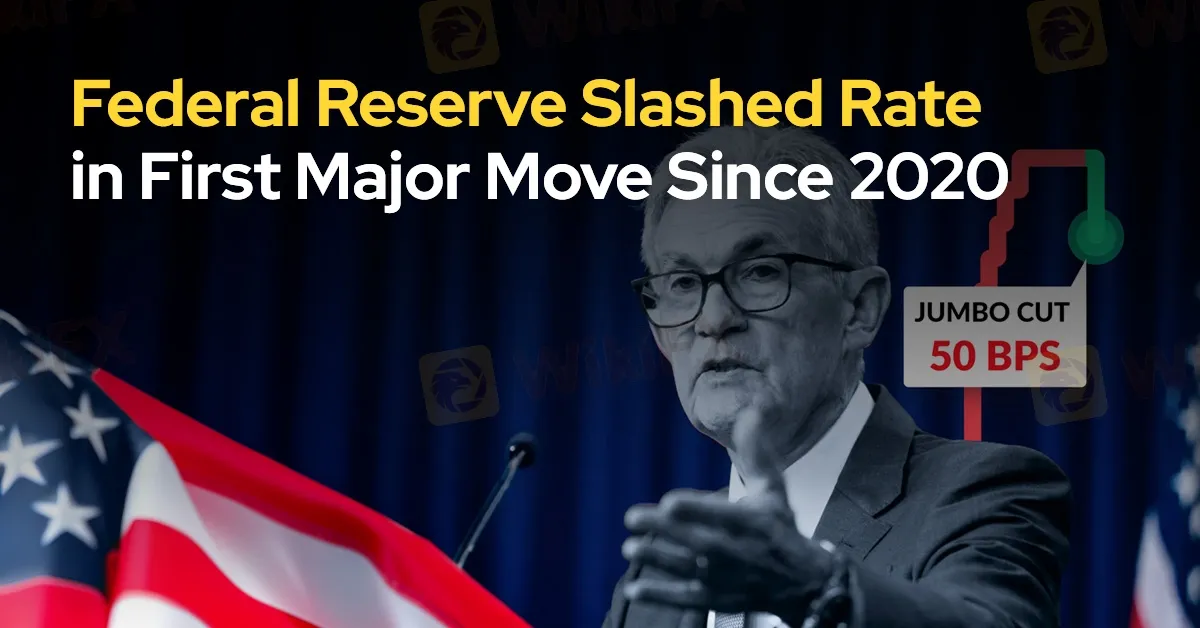简体中文
繁體中文
English
Pусский
日本語
ภาษาไทย
Tiếng Việt
Bahasa Indonesia
Español
हिन्दी
Filippiiniläinen
Français
Deutsch
Português
Türkçe
한국어
العربية
Federal Reserve Slashed Rate in First Major Move Since 2020
Abstract:The U.S. Federal Reserve has made its first interest rate cut in over four years, lowering the benchmark rate by half a percentage point. This significant reduction, which exceeds the typical quarter-point adjustments, signals growing concerns within the central bank about its ability to maintain control over inflation.

The U.S. Federal Reserve has made its first interest rate cut in over four years, lowering the benchmark rate by half a percentage point. This significant reduction, which exceeds the typical quarter-point adjustments, signals growing concerns within the central bank about its ability to maintain control over inflation. The Federal Open Market Committee (FOMC) has been focused on ensuring that inflation remains manageable while promoting maximum employment.
According to the Federal Reserve, the committee is working to achieve its long-term goals of 2% inflation and full employment. The FOMC indicated increased confidence that inflation is trending sustainably toward the 2% target, though it acknowledged that balancing these objectives continues to pose risks. The rate cut brings the federal funds rate to a range of 4.75% to 5%, signalling the beginning of the first easing cycle since the pandemic began in 2020.
The decision to cut rates comes after a period of more than two years of aggressive rate hikes aimed at combating inflation. Inflation had surged to 7% in 2022, but by July 2024, it had moderated to 2.5%. The Federal Reserve‘s recent statements reflect optimism regarding inflation’s trajectory, though the issue has not been fully resolved. Despite the reduction, inflation remains a pressing concern, according to a report by the Financial Times.

While the Federal Reserve has expressed confidence in the progress made toward achieving its inflation target, the decision to implement a half-point cut was not without controversy. Michelle Bowman, a member of the FOMC, reportedly opposed the decision, favouring a smaller, quarter-point reduction. Bowman's dissent marked a notable departure, as it was the first time a Fed governor had opposed a rate decision since 2005, according to CNN.
Economic analysts believe that the Federal Reserves decision could have wide-reaching effects on both the U.S. and global economies. Over the past few years, inflation was driven to a 40-year high due to pandemic-related disruptions and subsequent policy measures. With inflation now showing signs of moderation, the large rate cut may influence international markets. According to Reuters, the move is expected to impact currency valuations and global economic conditions, as such decisions often reverberate through the financial system.
The timing of the rate cut, coinciding with the buildup to the U.S. presidential election, adds another dimension to the economic landscape. The Federal Reserves actions may become a focal point in discussions around economic management, potentially influencing public perceptions of both inflation and cost-of-living issues. The scale of this reduction could also become a point of debate as political stakeholders weigh in on the broader implications for the U.S. economy.

Disclaimer:
The views in this article only represent the author's personal views, and do not constitute investment advice on this platform. This platform does not guarantee the accuracy, completeness and timeliness of the information in the article, and will not be liable for any loss caused by the use of or reliance on the information in the article.
Read more

Breaking News: Trump Announces 50% Import Tariff on Copper and 200% on Pharma
US President Donald Trump has announced a 50% tariff on copper and copper product imports to the country. He further warned that the import duty on pharmaceuticals can rise up to 200%. Read this to know more details.

Top Benefits of Forex Cards
Forex cards enable you to make seamless transactions in foreign currencies when travelling abroad. Check out this guide to learn the benefits of forex cards in detail.

Mule Accounts: The Secret Weapon Fake Forex Brokers Use to Dupe Investors
Explore this story where we have highlighted how fake forex brokers use mule accounts to dupe investors.

Fraud Brokers List for July 2025- EXPOSED
Attention investors and traders! If you want to invest in the forex market, be careful not to choose these scam brokers. This warning list is issued by the Financial Conduct Authority.
WikiFX Broker
Latest News
America's Deficit Reckoning: How the U.S. debt spiral could spark a crisis
Treasury yields hold steady as Trump extends tariff deadline
Gold Prices to Fluctuate This Week Amid July 9 Tariff Deadline, Fed Policy
FCA clarifies expectations on bullying, harassment and violence to deepen trust in financial service
XS.com Expands Global Reach with Landmark Kuwait Launch
10 Unlicensed Brokers Exposed – Check Now to Stay Safe!
Exposed: Ibell Markets - A Scam Broker That Does Not Allow Withdrawals
Asia-Pacific markets mostly rise as investors assess Trump's steep tariffs
MT4 vs MT5: A comprehensive comparison in terms of functionality
Top Forex Trading Strategies for the London Session
Currency Calculator


